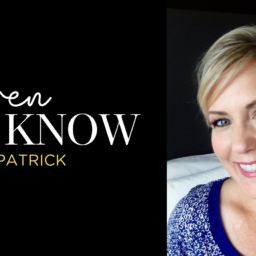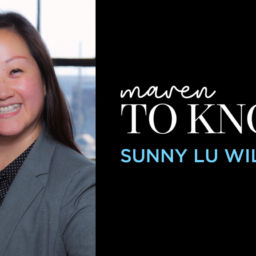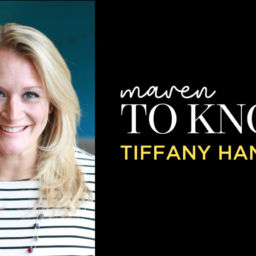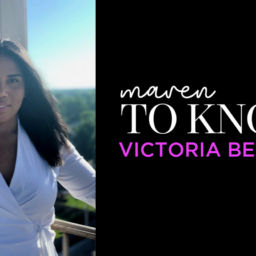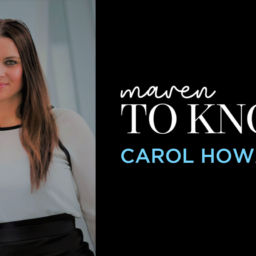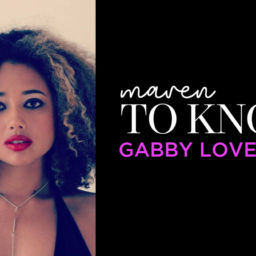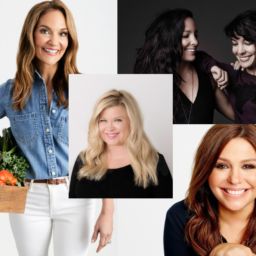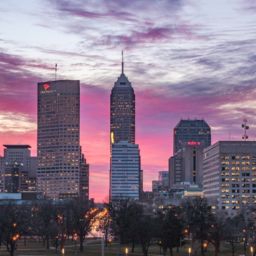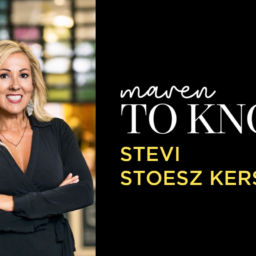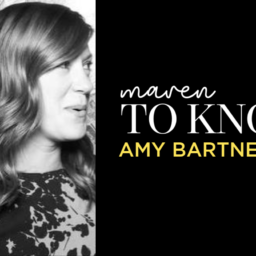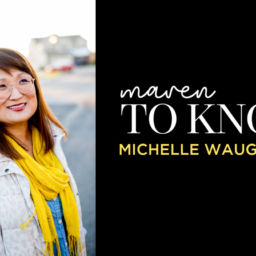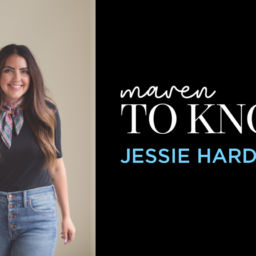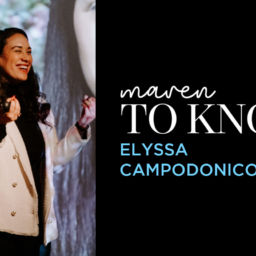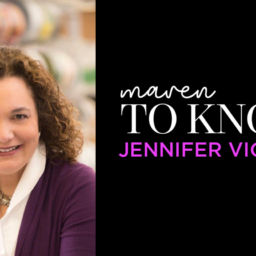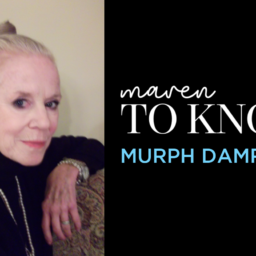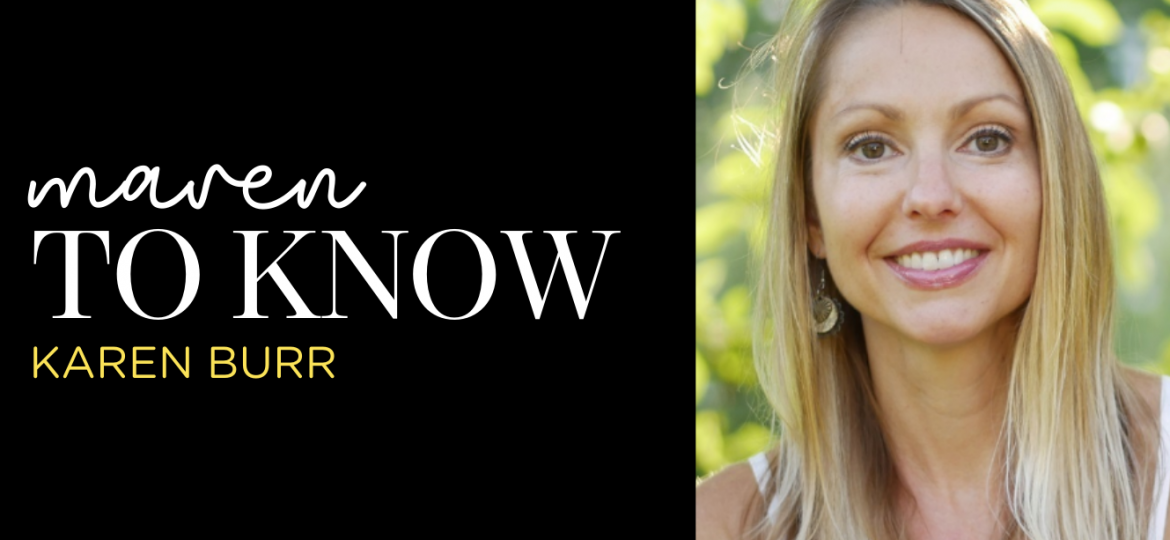
Maven to Know is weekly series by Indy Maven highlighting a member of our community. Want to be featured? Join us!
Karen Burr is a born and raised Hoosier on a mission to share the healing powers of plants through herbalism. Together with her business partner, Sara Redmon, she opened up Materia Medica Herbal Blending Spa in Greenwood, Indiana, which has been thriving for more than a decade. In addition to being an herbal blending spa, Burr uses her storefront to teach customers about herbalism and how plants can be utilized in nearly all aspects of health and wellness, not just for skincare benefits. Burr specifically focuses her practice on custom herbal skin treatments, vitalist health coaching, and clinical herbalism, and even has a referral system with a team of doctors on the southside.
“They send their patients to me for health coaching, skincare, and herbalism,” she says. “Inside my spa, I have an herbal apothecary kitchen where I’m able to keep all of my herbal blends and custom make whatever each person needs.”
Prior to opening her own herbal blending spa, Burr worked as a licensed esthetician for 17 years. She was largely inspired to open her own herbal blending spa, so she could help and coach people on how to treat their skin conditions from the inside out. So, she went back to school to be a holistic health practitioner. Since then, she’s graduated from five clinical herbal programs and has helped dozens of people with their skin insecurities.
We grabbed some time on Burr’s calendar and got the scoop on how herbs compare to essential oils, the benefits of holistic health, and what local eateries have the freshest and most natural ingredients.
Maven superpower: I feel like God blessed me with being able to be a connector. I love to be able to know who people are, what they’re doing to serve the community, and how they can serve someone else.
What does it mean to be an herbalist?
An herbalist is someone who studies and knows how to use plant medicine. So, if somebody has high blood pressure and they don’t want to take a statin drug because they’re so dangerous, we can use different lifestyle medicines. If somebody has high anxiety because they’ve been through a trauma or they have high anxiety because they’re mineral deficient, there are so many different reasons to say they don’t want to be stuck on Xanax, because it’s highly addictive. We’re able to get to root causes and use beautiful plants that grab a hold of the nervous system and bring them down. Passionflower is a plant that’s kind of like a beautiful form of Xanax.
So, you own an herbal blending spa and specialize in skincare. What does your skincare routine look like?
I’m a minimalist, so I make all my cleansers that are honey-based. I use my friend’s honey because it’s raw and I want all the medicinal benefits. And then I always blend different herbs into it and make my own skin mist from plant extract. Right now, I’m using one from my lilac bushes that I harvested this spring. Everything is seasonal. I’ll be doing fun stuff with sweet potatoes and butternut squash with all those cratinoids in the fall.
How would you describe your approach to health and wellness? Is there anything you try to avoid?
Living as close to nature as possible. Always. 100%. To make it really basic, it’s exactly what I do with my clients. I teach them how to eat local. I teach them that grocery stores should be a supplement, not the main. Most of the time people will go to a farmer’s market to supplement and do the main bulk of their grocery shopping at a grocery store. So, I teach them how to flip that. If your grocery budget is $200, then spend $150 at the farmers market and then the other $50 at a grocery store. And when we don’t have to take pharmaceuticals for something that is life-threatening, there is so much that we can do through food and plant medicine. I’m really big on avoiding plastics, avoiding artificial everything. So, making our own cleaning chemicals for our home. There are so many things you can do now where you’re not buying things in plastic. So really just everything is as nature-based as possible.
Essential oils have grown in popularity over the years. How does it compare to herbalism?
The huge difference between herbalism and essential oils is sustainability. In order to make one ounce of an essential oil you have to have pounds of the plant matter to distill. This is why we see so many essential oil companies that have started cutting their oils for larger quantities and larger profits. I prefer to work with the chemistry and energy of the whole plant where one large echinacea plant, root to flower, is used to make 16 ounces of plant medicine. Both essential oils and herbal remedies have their place and are beautiful medicine, but you will never see herbalism become an MLM company.
RELATED: MAVEN TO KNOW: STEPHANIE DAILY
Herbalism is such a niche area. How did you become interested in it?
I became interested in herbalism when I knew that I had a missing link with my clients both in the treatment room for a skin condition or the client who could be struggling with a chronic health condition. I had already been a licensed esthetician and holistic health practitioner teaching food as medicine and working with our local farming community. When I found The Chestnut School of Herbal Medicine in the Appalachian Mountains, I knew that was my starting point and I still have not stopped learning herbal medicine. I can’t wait to tour other countries and regions to learn plant medicine from around the globe.
Can you tell us about some local places that train herbalists?
Here in Indy, we have White Pine Wilderness Academy that I also took seasonal herbalism classes from, Greg Monzel at Wild Persimmon School of Natural Medicine, and Constance Ferry at Hobbit Gardens out in Fillmore, Indiana. My personal favorite is the Chestnut School of Herbalism, where I got my start.
What are the benefits of using herbs compared to ibuprofen or other pain medicine?
With pain relief, there are so many questions that I have to ask with a full health history and at least a 90-minute consultation to help understand why people would have either. There are many herbal, nutrient profiles, and energetic remedies but in my world of holistic health, the symptom has a story and a mystery that needs time to figure out and custom formulating for the right remedies. Consumerism tells us that we need to dull our pain instead of figuring out why we have it.
Tell us about some of your favorite places to grab produce or herbs.
Knowing the lack of nutrients in mass-produced grocery store produce, I always shop with our local farmer’s markets — Wildwood Market, Turchetti’s Deli, Country Nutrition. I also grow my own food. You would also be amazed at the nutrient density of our wild foods right in our own yards that are of course not sprayed with toxins such as dandelion leaves and roots. The nutrients in these wild foods surpass any grocery green in vitamins and minerals.
If you were on a deserted island and could only bring three things with you, what would they be and why?
A pillow for something soft to lay my head on, a blanket for cool evenings, and a foraging knife to utilize plant medicine around me, which is why studying indigenous herbalism in rainforests would come in handy.
Samantha Kupiainen is a regular Indy Maven contributor.
All of our content—including this article—is completely free. However, we’d love if you would please consider supporting our journalism with an Indy Maven membership.







